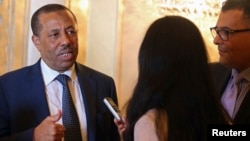Libya's elected parliament held U.N.-brokered talks with foes tied to a rival assembly on Monday calling for a cease-fire by armed factions and more dialogue to end a confrontation driving the OPEC member state close to civil war.
The House of Representatives, the internationally recognized parliament elected in June, was uprooted last month when an armed group from the western city of Misrata took control of the capital Tripoli and set up its own assembly and cabinet there.
The meeting in Ghadames, a southern town near the Algerian border, was brokered in an attempt to prevent the confrontation from descending into civil war, three years after the uprising that ended the 42-year rule of Moammar Gadhafi.
U.N. Special Envoy Bernandino Leon said after the meetings that both sides agreed on the need for a ceasefire, for humanitarian aid for victims of recent clashes in Tripoli, and to work to reopen airports closed by fighting.
"We have agreed to start a political process to address all issues on the elements on the situation in Libya today and to do it in a peaceful way with a very strong call for a complete ceasefire all over the country," he said.
The negotiations are likely just an initial phase, including the House of Representatives and only elected deputies from Misrata, who have boycotted the chamber's sessions since it was convened in August.
The talks did not take in armed factions from Misrata who have seized Tripoli and set up the alternative assembly, or rival militia allied to the western city of Zintan who battled Misrata forces in Tripoli for more than a month over the summer.
Armed Turmoil
Those armed clashes mostly over control of Tripoli international airport, involving volleys of Grad rockets and mortars, were the worst street fighting in the capital since thefall of Gadhafi in 2011.
The armed factions are brigades of former rebels who once fought side by side against Gadhafi, but have since sided with rival political groups, and turned on each other in a battle for control of the North African country and its resources.
Libya's weak central government and fledging national army have been no match for the well-armed factions, who both claim legitimacy for their role in the NATO-backed civil war that ended the late Gadhafi's one-man autocracy.
Despite the political disorder, Libya's oil production has been recovering after a year of strikes, blockades and protests by armed groups slashed the OPEC nation's output. Crude production is now around 900,000 barrels per day compared with below 200,000 bpd at the height of the crisis.
Before the negotiations, Tripoli lawmaker Ali Tekbali said he expected little from the meeting, because it did not directly include representatives of the armed factions.
Other lawmakers and diplomats welcome the prospect of talks in the vast desert country.
They hope that since Misrata-members from the house are indirectly linked to the rival parliament in Tripoli, the meeting will start a broader political dialogue, not just about the House of Representatives.
A previous United Nations initiative for a national dialogue, planned before fighting in Tripoli escalated in July, failed amid a public outcry, with the world body coming under criticism for alleged interference.
Hours before details of the meeting emerged, Prime Minister Abdullah al-Thinni and his cabinet took the oath of office after lawmakers approved the line-up of his government.
Last week the House of Representatives agreed on a second cabinet list after rejecting an initial 16-member one as too large.
The new cabinet has 13 ministers including three deputies for Thinni but no oil minister. The vital oil sector will be run by state firm National Oil Corp (NOC), as it was under Gadhafi.
Thinni, a former career soldier, has been prime minister since March but had resigned after a June election. Lawmakers then asked him to again form a new government.






